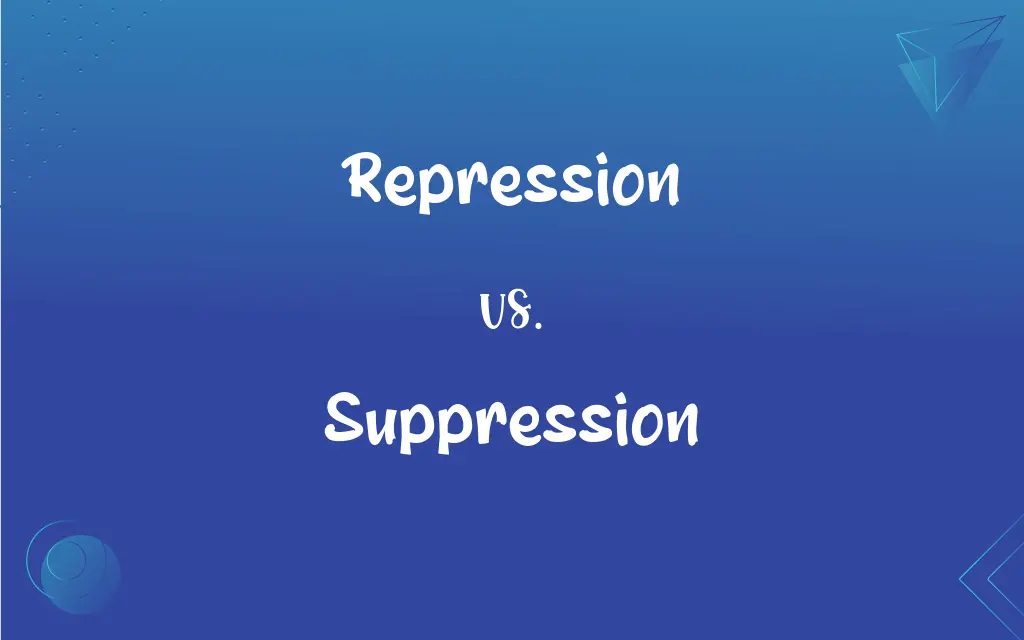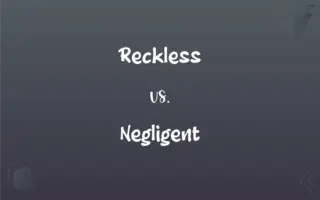Repression vs. Suppression: What's the Difference?
Edited by Aimie Carlson || By Harlon Moss || Published on November 13, 2023
Repression is the unconscious hiding of uncomfortable thoughts, while suppression is the conscious decision to avoid or push away certain thoughts.

Key Differences
Repression pertains to the unconscious forgetting of distressing memories or emotions. In contrast, suppression revolves around the conscious act of deliberately avoiding certain feelings or thoughts.
Repression stems from an automatic, often unconscious defense mechanism protecting the mind from traumatic memories. On the other hand, suppression results from a conscious choice to set aside particular emotions or memories temporarily.
In therapy, repression may be explored to unearth unresolved issues from the past. Suppression might be discussed in terms of coping mechanisms and ways individuals intentionally navigate their emotions.
Over time, constant repression can lead to unexpected emotional outbursts or psychological issues. Frequent suppression, while sometimes beneficial short-term, might result in physical or emotional stress if overused.
Individuals might not be immediately aware of what they've repressed, given its unconscious nature. In contrast, suppression usually involves a clear awareness of what's being set aside and why.
ADVERTISEMENT
Comparison Chart
Nature
Unconscious
Conscious
Origin
Defense mechanism
Deliberate choice
Awareness
Individuals might not be immediately aware
Clear awareness
Resulting Issues
Can lead to unexpected emotional outbursts
Might lead to physical or emotional stress
Used in Therapy to
Address unresolved past issues
Discuss coping mechanisms
ADVERTISEMENT
Repression and Suppression Definitions
Repression
A mental defense mechanism preventing certain events from entering conscious awareness.
Due to the repression of the accident, she couldn't recall crucial details.
Suppression
Intentionally avoiding or putting aside distressing feelings or memories.
After the argument, she practiced suppression by not thinking about it.
Repression
The act of pushing away unwanted memories without realizing it.
Repression of his past mistakes affected his current relationships.
Suppression
The act of consciously setting aside certain feelings or memories.
Through suppression, he focused on the task and not his anxiety.
Repression
An involuntary psychological mechanism keeping disturbing thoughts out of consciousness.
Through repression, he forgot the traumatic event, even though it shaped his fears.
Suppression
A voluntary restraint of emotional or cognitive processes.
The suppression of his fears allowed him to face the challenge head-on.
Repression
The unconscious exclusion of painful memories or thoughts.
Childhood traumas might lead to repression, manifesting in mysterious adult behaviors.
Suppression
The conscious act of controlling and curtailing unwanted thoughts or emotions.
He used suppression to avoid addressing his grief.
Repression
The mind's way of protecting itself by blocking certain memories.
Therapy helped her uncover the repression of her distressing childhood memories.
Suppression
Deliberately choosing not to deal with particular emotions temporarily.
For the sake of the team, she used suppression to hide her disappointment.
Repression
The act of repressing or the state of being repressed.
Suppression
The act of suppressing.
Repression
(Psychology) The unconscious exclusion of painful impulses, desires, or fears from the conscious mind.
Suppression
The state of being suppressed.
FAQs
Can someone choose to suppress their feelings?
Yes, suppression is a conscious decision to avoid certain feelings.
Are repressed memories permanently forgotten?
Not necessarily. Repressed memories can resurface, especially in therapy.
Is repression a conscious act?
No, repression is an unconscious mechanism.
Is suppression always negative?
No, suppression can be a helpful short-term coping mechanism, but overuse can lead to stress.
How does repression differ from suppression in awareness?
Repression is unconscious, while suppression involves clear awareness.
Can suppression be used as a temporary solution?
Yes, suppression can be a temporary way to manage overwhelming emotions.
Can repression lead to psychological issues later in life?
Yes, constantly repressed memories or feelings can lead to unresolved psychological issues.
Are suppressed feelings easier to access than repressed ones?
Typically, yes, since suppression is a conscious act, and the individual knows what they're avoiding.
Can you suppress a memory intentionally?
Yes, suppression involves consciously deciding to avoid a memory or emotion.
Is either repression or suppression a long-term solution?
Both can lead to issues if relied upon long-term, but they might offer short-term relief.
Can suppressed feelings resurface suddenly?
Yes, especially if triggered by a particular event or situation.
Are repressed emotions deep-rooted?
Often, yes. Repressed emotions can be deeply embedded and might require effort to unearth.
How might repression manifest in someone's behavior?
Repression can lead to unexplained emotional reactions or behaviors linked to forgotten memories.
Why might someone choose suppression over addressing an emotion?
They might deem it not the right time or place, or they might feel overwhelmed.
Do both repression and suppression protect the individual?
Both can serve as protective mechanisms, but over-reliance can be harmful.
Are there any physical symptoms associated with repression or suppression?
Both can lead to physical symptoms like headaches, fatigue, or even more severe health issues if overused.
Is repression always automatic?
Repression is typically an automatic defense mechanism of the mind.
Can therapy help address repression?
Yes, therapy can help uncover and address repressed memories and emotions.
Does suppression require energy?
Yes, constantly suppressing emotions or memories can be mentally exhausting.
Can understanding suppression help in emotional regulation?
Yes, being aware of suppression can help one address emotions more healthily.
About Author
Written by
Harlon MossHarlon is a seasoned quality moderator and accomplished content writer for Difference Wiki. An alumnus of the prestigious University of California, he earned his degree in Computer Science. Leveraging his academic background, Harlon brings a meticulous and informed perspective to his work, ensuring content accuracy and excellence.
Edited by
Aimie CarlsonAimie Carlson, holding a master's degree in English literature, is a fervent English language enthusiast. She lends her writing talents to Difference Wiki, a prominent website that specializes in comparisons, offering readers insightful analyses that both captivate and inform.








































































